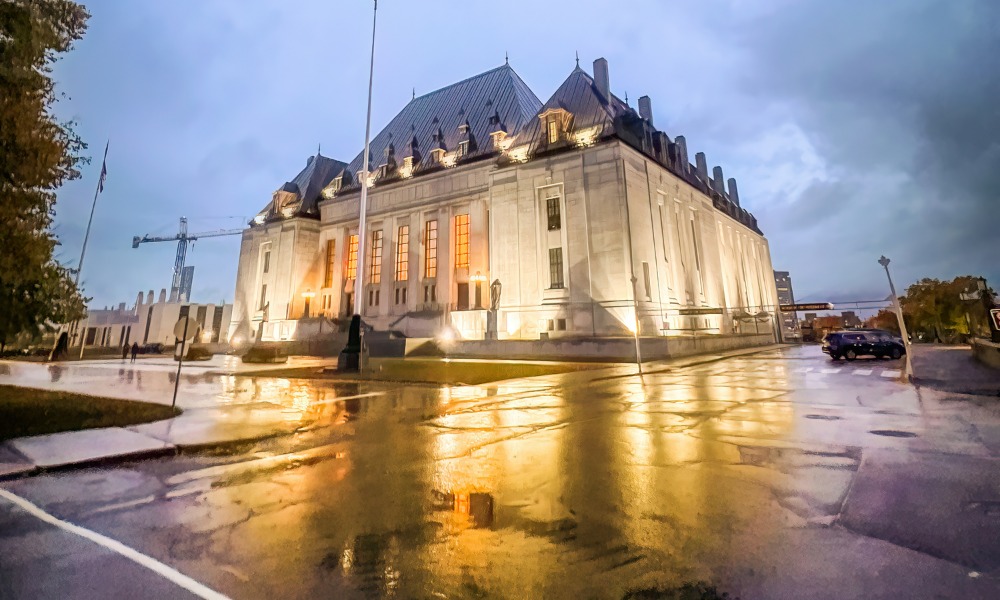Convictions restored for man who surreptitiously photographed kids in dressing room

The Supreme Court of Canada has clarified the criminal offence of voyeurism, finding that it is not necessary that an accused reasonably expected nudity or sexual activity to occur at the time of the alleged offence, only that they expect it to occur where the offence took place.
The court released its reasons in R. v. Downes, 2023 SCC 6 Friday morning. With a panel of seven judges, the SCC unanimously restored the convictions of a hockey coach who had secretly taken photos of his young players in an arena dressing room.
“This Supreme Court’s decision clarifies the law by confirming that an accused cannot engage in voyeuristic behaviour even if nudity is not occurring at the exact time of the offence,” says Micah Rankin, counsel for Crown. “This ensures that there are ‘safe places’ – as the Supreme Court writes – where individuals are protected from being observed or recorded at all times, even if nudity is only expected sometimes.”
“They made it clear that the nature of the place is the key focus of the section, rather than the specific time and what was happening at the specific time that the photographs were taken,” says Donald Sorochan, counsel for Randy William Downes.
The court also explicitly recognized that voyeurism is gendered, says Jane Bailey, who was counsel for the Samuelson-Glushko Canadian Internet Policy and Public Interest Clinic, along with David Fewer.
"This goes some way toward recognizing the systemic equality impacts of sexual violence on women and other gender-marginalized people," she says.
The court also found that the Crown does not need to prove that the accused had a sexual purpose when taking surreptitious photos in safe spaces such as changerooms.
"This is in keeping with the sexual integrity approach to sexual violence articulated by Professor Elaine Craig and adopted in previous SCC decisions," says Bailey. "Under that approach, the focus isn’t simply on 'the sexual motives, arousal, or body parts of the accused, or the community’s standard of sexual propriety, but also [on] the perception, experience, and impact on the complainant,' which impacts can include lasting emotional and psychological harm."
A British Columbia court convicted Downes on two counts of voyeurism for covertly taking 38 photos of two boys, who were between 12 and 14, in a hockey arena dressing room while the boys were in their underwear.
Under s. 162.(1)(a) of the Criminal Code, there are four elements to the voyeurism offence. The accused must have observed or made the recording intentionally, surreptitiously, in circumstances where there was a reasonable expectation of privacy, and in a location where a person can reasonably be expected to be nude.
The trial judge found that the fourth element had “no implicit temporal component.” It was that a person could reasonably expect there to be nudity at a place, not whether they would expect it at a particular time, which was relevant. To convict, it was sufficient that people change and shower in dressing rooms and can be expected to be naked.
In allowing Downes’ appeal, setting aside his convictions, and ordering a new trial, the Court of Appeal’s majority found that the trial judge had failed to consider whether nudity was reasonably expected at the time Downes surreptitiously photographed the boys. The appeal-court dissenter agreed with the trial court judge that s. 162(1)(a) is about place, not time.
“The Supreme Court did not agree with the majority’s reading of the offence,” says Rankin. “The interpretation of the majority in the Court of Appeal imposed a standard on the Crown that would be hard to meet in many cases. This is illustrated by the fact that the majority found that a hockey arena dressing rooms was not a place where nudity was reasonably expected.”
The SCC appeal dealt with two issues: whether s. 162(1)(a) has an implicit temporal component, and if it does not, whether the provision is unconstitutionally overbroad contrary to s. 7 of the Charter.
Downes argued that the provision requires proof that nudity is reasonably expected at the specific time and location of the surreptitious recording, and the temporal component remains aligned with its purpose of prohibiting breaches of sexual privacy. An infringement of sexual integrity is necessary, and a risk of infringement is not enough. Because none of the boys in the photos were nude, and there was no reasonable expectation they would be when he took the photos, the court cannot infer that he intended to take a nude photo, he said.
Examining the text, context, and purpose of the provision, the SCC found that reading s. 162(1)(a)’s prohibition without a temporal component “promotes Parliament’s purposes of protecting privacy and sexual integrity,” said Justice Mahmud Jamal, who wrote the reasons. Interpreting the provision with a temporal component detracts from that purpose, he said.
“The Court’s approach to sexual integrity is interesting,” says Rankin. “The Court emphasized that interferences with sexual integrity are not limited to interferences with a person’s body or to overt sexual acts, but also with violations of trust and the sexual objectification of a victim.”










